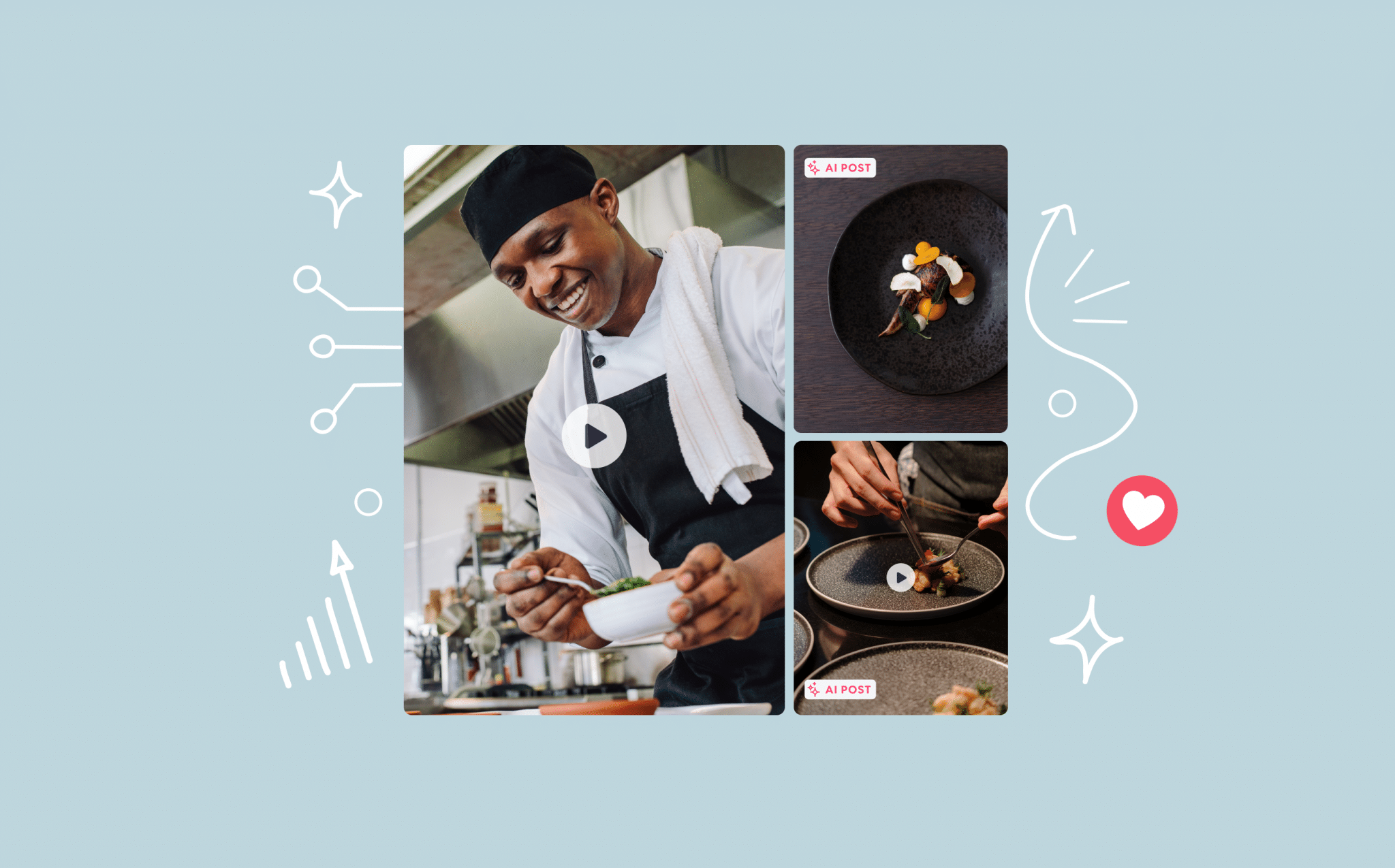
Why Your Restaurant Needs AI Now: Tools to Transform Service and Sales

- Blog
- Small Business Tips
- Why Your Restaurant Needs AI Now: Tools to Transform Service and Sales
The restaurant industry faces numerous challenges, including labor shortages, rising operational costs, and increasing customer expectations. As restaurants strive to maintain high standards of service and efficiency, they’re constantly looking for innovative solutions to stay competitive. One of the most promising advancements in recent years is the integration of Artificial Intelligence (AI) into various aspects of restaurant operations.
AI technology is rapidly gaining traction across different industries, and its importance is growing in the restaurant sector as well. A promising 71.6% of restaurant operators plan to adopt AI soon, with nearly 94% acknowledging its necessity to remain competitive in the evolving landscape of food service. AI offers powerful tools and solutions that can address many of the challenges faced by the restaurant industry, from streamlining operations and enhancing customer experiences to optimizing labor management and ensuring food safety.
In this blog post, we’ll explore how AI can revolutionize the restaurant business, delving into various applications of AI in restaurant operations. By leveraging AI, restaurants can not only improve their efficiency and profitability but also provide a superior dining experience that meets the ever-evolving expectations of their customers.
Marketing and Content Creation with AI
AI technology is revolutionizing marketing and content creation in the restaurant industry, enabling businesses to create targeted campaigns and engaging content with unprecedented efficiency and precision.
AI-Assisted Content Creation
AI tools for content creation enable restaurants to produce high-quality, engaging content quickly and efficiently. These tools can generate a wide range of content, from social media posts and blog articles to promotional materials and menu descriptions.
One notable AI content creation tool is PromoAI. Designed for businesses of any size, PromoAI uses advanced technology to deliver quality video and social content 20 times faster than traditional tools. PromoAI offers features like batch video generation, AI-driven script and caption creation, and cross-channel optimization and publishing.
The benefits of AI-assisted content creation include:
- Efficient Content Production: AI tools can generate large volumes of content quickly, allowing restaurants to maintain a dynamic and engaging online presence.
- High-Quality Content: AI tools like PromoAI ensure that content is professionally crafted, with accurate and compelling messaging tailored to the target audience.
- Multi-Channel Optimization: AI tools can optimize content for various channels, ensuring consistency and effectiveness across social media, websites, and other platforms.
Online Reputation Management
AI can also play a crucial role in managing a restaurant’s online reputation. By monitoring reviews and social media mentions, AI-driven sentiment analysis tools can detect negative reviews and alert restaurant managers in real-time. This allows managers to address customer concerns promptly and maintain a positive brand image.
The benefits of AI in online reputation management include:
- Proactive Issue Resolution: Real-time alerts enable quick responses to negative feedback, preventing small issues from escalating.
- Improved Customer Satisfaction: Promptly addressing concerns shows customers that their feedback is valued and taken seriously.
- Enhanced Brand Image: Consistently positive interactions and swift issue resolution help build a strong, trustworthy brand reputation.
AI in Restaurant Operations
The integration of AI in restaurant operations offers new levels of efficiency and customer satisfaction, streamlining various aspects of restaurant management.
Automated Ordering Systems
AI-driven ordering systems are revolutionizing the way quick-service restaurants manage their operations. These systems utilize advanced algorithms and machine learning to streamline the ordering process, providing a seamless experience for both customers and restaurant staff.
In AI-driven ordering systems, customers can place their orders through various interfaces such as kiosks, mobile apps, or online platforms. These systems can understand and process natural language, making the ordering process more intuitive and user-friendly. For instance, a customer can simply say, “I want a cheeseburger with extra pickles and no onions,” and the AI system will accurately capture the order details. This reduces the need for manual input, thereby minimizing the chances of errors that often occur with traditional methods.
The benefits of AI-driven ordering systems include:
- Reduced Wait Times: Customers no longer have to wait in long lines to place their orders, which enhances their overall dining experience.
- Minimized Order Errors: This leads to higher customer satisfaction and fewer complaints.
- Improved Efficiency: AI systems allow restaurant staff to focus on other critical tasks, such as food preparation and customer service, ultimately boosting the restaurant’s operational efficiency.
Inventory and Supply Chain Management
AI can also play a pivotal role in optimizing inventory and supply chain management for restaurants. By leveraging predictive analytics and machine learning algorithms, AI systems can accurately forecast demand and manage inventory levels more effectively.
Predictive inventory management uses historical sales data, seasonal trends, and other relevant factors to predict future demand for various ingredients. This ensures that restaurants always have the right amount of stock on hand, reducing the risk of running out of essential items during peak hours. Moreover, AI can identify patterns in customer preferences and adjust inventory levels accordingly, ensuring that popular items are always available.
The benefits of AI-driven inventory management include:
- Reduced Food Waste: By accurately predicting demand, restaurants can order only the necessary quantities of ingredients, thereby minimizing surplus and spoilage.
- Consistent Supply of Ingredients: Optimized stock levels ensure a consistent supply of ingredients, which is crucial for maintaining menu consistency and meeting customer expectations.
- Automated Ordering Process: AI systems can automate the ordering process, generating purchase orders based on predicted needs, saving time and reducing the chances of human error.
Enhancing Customer Experience with AI
In the highly competitive restaurant industry, providing an exceptional customer experience is key to attracting and retaining patrons. AI technology offers powerful tools to enhance customer interactions, ensuring that each dining experience is memorable and personalized.
Personalized Marketing
Personalized marketing leverages AI to analyze customer data and tailor marketing campaigns to individual preferences and behaviors. By collecting and processing vast amounts of data, AI can uncover patterns and insights that human analysts might miss. This data-driven approach allows restaurants to create highly targeted marketing campaigns that resonate with specific customer segments.
AI-driven tools can analyze customer purchase histories, dining preferences, and feedback to create personalized offers and promotions. For example, a restaurant can send customized emails or app notifications featuring favorite dishes, special discounts on frequently ordered items, or exclusive invitations to events. AI can also optimize the timing and channels for these communications, ensuring they reach customers when they are most likely to respond.
The benefits of personalized marketing with AI include:
- Increased Customer Engagement: Tailored offers and promotions resonate more with customers, leading to higher engagement rates and repeat visits.
- Enhanced Customer Loyalty: Personalized communications make customers feel valued and understood, strengthening their connection to the brand.
- Effective Use of Marketing Budget: AI optimizes the allocation of marketing resources, ensuring that campaigns reach the right audience at the right time for maximum impact.
Chatbots and Virtual Assistants
AI-powered chatbots and virtual assistants are transforming customer service in the restaurant industry. These tools can handle a wide range of customer inquiries, from answering questions about menu items and operating hours to making reservations and managing delivery orders.
Implementing AI chatbots on a restaurant’s website, mobile app, or social media platforms provides customers with instant, 24/7 support. Customers no longer have to wait for business hours to get answers to their questions or make a reservation. This level of accessibility significantly enhances the customer experience by providing convenience and reducing wait times.
The benefits of AI chatbots and virtual assistants include:
- Improved Accuracy and Consistency: AI chatbots provide precise responses, building trust with customers by ensuring reliable information every time.
- Handling Multiple Interactions: Chatbots can manage numerous inquiries simultaneously, alleviating staff during peak times and improving overall efficiency.
- Data Collection and Insights: AI chatbots collect valuable data on customer preferences and behaviors, which can refine marketing strategies and personalize customer experiences.
AI in Food Preparation and Safety
AI technology is transforming the food preparation and safety aspects of the restaurant industry, ensuring consistency, efficiency, and high standards of hygiene. By integrating AI-powered robotic food preparation and advanced food safety monitoring systems, restaurants can deliver superior quality while maintaining stringent safety protocols.
Robotic Food Preparation
AI-powered kitchen robots are revolutionizing how food is prepared in restaurants. Examples of these innovations include Chipotle’s Chippy and White Castle’s Flippy. These robotic systems are designed to perform repetitive and precise cooking tasks, ensuring that food is prepared consistently and efficiently.
Chippy is Chipotle’s AI-driven robot designed to fry tortilla chips to perfection. It replicates the techniques of human cooks by adjusting the frying time and seasoning based on real-time data, ensuring each batch meets the restaurant’s quality standards. This not only enhances the consistency of Chipotle’s signature chips but also frees up human staff to focus on more complex culinary tasks.
Flippy, created by Miso Robotics, is used by White Castle and other fast-food chains to cook burgers and fries. Flippy can operate grills, fryers, and other kitchen equipment with precision, ensuring that each item is cooked to the exact specifications. The robot uses sensors and cameras to monitor cooking times and temperatures, adjusting as needed to maintain quality.
The benefits of robotic food preparation include:
- Consistency in Food Quality: Robots follow exact instructions without the variability that can come from human error, ensuring consistent food quality and maintaining brand standards.
- Increased Efficiency: AI-powered robots work faster and more accurately than human workers, especially during peak hours when quick service is essential.
- Enhanced Worker Safety: Robots take over hazardous tasks such as deep frying and grilling, reducing the risk of burns and other injuries in the kitchen.
Food Safety Monitoring
Ensuring food safety is a critical aspect of restaurant operations, and AI systems are playing a pivotal role in monitoring hygiene standards and preventing foodborne illnesses. AI-driven food safety monitoring solutions utilize sensors, cameras, and data analytics to oversee various aspects of food handling and storage.
AI systems can continuously monitor the temperature and humidity levels in storage areas, ensuring that perishable items are kept within safe ranges. This prevents spoilage and reduces the risk of foodborne pathogens proliferating. For example, if the temperature in a refrigerator rises above a safe level, the AI system can send an alert to staff to take corrective action immediately.
In the kitchen, AI-powered cameras and sensors can detect potential hygiene issues, such as improper handwashing or cross-contamination between raw and cooked foods. These systems can provide real-time feedback and training to staff, ensuring that best practices are followed consistently. Some advanced AI solutions can even identify specific contaminants on surfaces or food items, further enhancing food safety measures.
The benefits of AI in food safety monitoring include:
- Prevention of Foodborne Illnesses: AI systems ensure that food is stored and handled in accordance with safety regulations, reducing the risk of outbreaks and protecting customer health.
- Compliance with Safety Standards: AI-driven monitoring systems ensure compliance with local and national food safety standards, helping restaurants avoid fines and reputational damage associated with food safety violations.
- Proactive Approach: By continuously monitoring and analyzing data, AI systems can identify potential issues before they become serious problems, enhancing overall food safety.
Streamlining Administrative Tasks with AI
In addition to enhancing customer experiences and food preparation, AI technology is also revolutionizing the administrative side of restaurant operations. By automating routine tasks such as invoice processing and menu management, AI solutions help restaurants improve efficiency and accuracy, freeing up valuable time for staff to focus on more strategic activities.
Automated Invoice Processing
Handling invoices and maintaining accurate financial records are essential yet time-consuming tasks for any restaurant. AI solutions for automated invoice processing offer a way to streamline these operations, reducing the administrative workload and minimizing errors.
AI-powered invoice processing systems use optical character recognition (OCR) and machine learning algorithms to scan, read, and interpret invoice data. These systems can automatically extract relevant information such as vendor names, invoice amounts, dates, and line items, and then enter this data into the restaurant’s accounting software. This process eliminates the need for manual data entry, significantly reducing the risk of errors that can occur when handling large volumes of invoices.
The benefits of automated invoice processing include:
- Time Savings: Automated systems process invoices much faster than humans, allowing restaurant staff to focus on more critical tasks such as managing operations and serving customers.
- Improved Accuracy: By minimizing human errors, these systems help prevent discrepancies that can lead to financial losses or compliance issues.
- Enhanced Cash Flow Management: Automated invoice processing ensures timely payments and better tracking of outstanding invoices, improving overall cash flow management.
Menu Management
AI-driven tools for menu management are transforming how restaurants design and maintain their menus. These tools use advanced algorithms to optimize menu content and presentation, ensuring that menus are both appealing and effective in driving sales.
One of the key applications of AI in menu management is content creation. AI tools can generate high-quality, multi-language menu descriptions quickly and accurately. By analyzing customer preferences, popular dishes, and sales data, these tools can craft descriptions that highlight the most appealing aspects of each dish. This not only enhances the customer’s dining experience but also helps to increase sales by enticing customers to try new or featured items.
AI can also assist in menu optimization by analyzing sales data and customer feedback to determine which dishes are performing well and which are not. Based on this analysis, AI tools can recommend adjustments to the menu, such as removing underperforming items, highlighting popular dishes, or introducing new offerings. This data-driven approach ensures that the menu remains dynamic and aligned with customer preferences.
The benefits of AI-driven menu management include:
- High-Quality, Accurate Descriptions: AI tools generate clear and enticing menu descriptions, improving the overall dining experience for customers.
- Multi-Language Support: Particularly beneficial for diverse or tourist-heavy areas, ensuring that all customers can easily understand the menu.
- Continuous Optimization: By continuously optimizing the menu based on real-time data, restaurants can enhance customer satisfaction and boost revenue.
Overcoming Labor Shortages with AI
The restaurant industry is frequently challenged by labor shortages, which can impact service quality and operational efficiency. AI technology offers practical solutions to address these issues by optimizing labor management and enhancing training and development programs.
Labor Optimization
AI tools are increasingly being used to optimize staff schedules and predict peak times in the restaurant industry. These tools leverage data analytics and machine learning algorithms to analyze historical sales data, reservation patterns, and other relevant factors. By understanding these trends, AI systems can create optimal staffing schedules that align with anticipated demand.
The benefits of AI-driven labor optimization include:
- Ensuring Adequate Staffing Levels: By predicting peak times accurately, AI tools help managers allocate the right number of staff members for each shift, ensuring consistent customer service even during busy periods.
- Improving Employee Satisfaction and Retention: AI tools can factor in employee preferences and availability, creating schedules that enhance work-life balance, which leads to a more satisfied and motivated workforce.
- Cost Savings: By aligning staffing levels with actual demand, restaurants can minimize labor costs associated with overstaffing during slower periods, maintaining profitability while upholding service standards.
Training and Development
Training and development are critical components of a successful restaurant operation, especially in an industry characterized by high turnover rates. AI-powered training programs offer a consistent and effective approach to onboarding new hires and providing ongoing development for existing staff.
AI-driven training programs utilize interactive modules, simulations, and personalized learning paths to deliver comprehensive training experiences. These programs can be tailored to the specific needs of the restaurant, ensuring that all employees receive standardized training on essential topics such as food safety, customer service, and operational procedures.
The benefits of AI-powered training include:
- Consistency in Training: Standardizing training content and delivery ensures all employees receive the same high-quality instruction, maintaining uniform service standards across different shifts and locations.
- Accelerated Onboarding: New hires can complete training modules at their own pace, reducing the time required for managers to conduct in-person sessions, and enabling new employees to become productive more quickly.
- Ongoing Staff Development: AI-driven platforms can identify skill gaps and recommend targeted training programs, helping employees continuously improve their skills and advance in their careers, fostering a culture of growth and learning within the restaurant.
Future-Proofing Your Restaurant with AI
In today’s rapidly evolving restaurant industry, staying competitive requires innovation and efficiency. AI technology offers a multitude of solutions to help restaurants overcome various challenges, from improving marketing to streamlining operations and enhancing customer experiences. By integrating AI into their business strategies, restaurants can not only improve their operational efficiency but also provide personalized and engaging dining experiences that foster customer loyalty and satisfaction.
To take your restaurant’s marketing to the next level, try PromoAI today. Generate engaging videos, optimize your social media presence, and deliver personalized content that resonates with your audience.
Meet PromoAI
Generate a month worth of video content for your business in just one click!
About the author
Daisy Rogozinsky
Daisy Rogozinsky loves to use the written word to educate, entertain, and tell stories. If she's not writing content, she's writing poetry, music, and screenplays.


